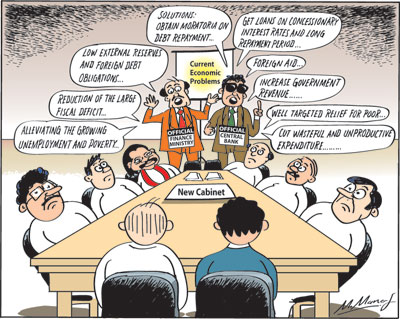Columns
Urgent economic challenges for the new government
View(s):The new Cabinet of Ministers that were sworn in on Wednesday face an immediate task of stabilising the economy. Mitigating the external financial vulnerability, reduction of the large fiscal deficit, reducing the growing unemployment in the country and alleviating poverty are challenging tasks in the current inhospitable global economic environment. However their resolution is vital to usher in economic growth in the medium and long run.
 Policies
Policies
Policies to stabilise the economy may not be popular in the short run, but are imperative in the interests of the country. Irrespective of the promises given during the elections, the new Government must adopt economic policies that stabilise the economy while resolving the immediate economic and social problems of increasing unemployment and poverty in the country.
The Government’s commanding majority in parliament should embolden it to take correct economic policies in spite of their unpopularity. This is especially true in respect to measures that need to be taken to contain the large fiscal deficit.
Immediate action
Immediate measures to avert a further worsening of the economic conditions and a vision and policies for long term economic growth and social development are needed.
Weak economy
However, the country’s weak macroeconomic conditions and the recessionary global economy make the economic recovery difficult. This is especially so as the global economic recovery is very uncertain as the containment of the world-wide COVID-19 pandemic is a precondition for the global economic revival. In turn, the trade, tourist and foreign remittances dependent Sri Lankan economy is dependent on the global economic recovery.
Immediate problems
The new Government has to resolve several economic problems before embarking on an economic growth strategy. These include the need to address the country’s external financial vulnerability and reduction of the large fiscal deficit by enhancing government revenue. These have to be achieved while addressing the problems of growing unemployment and poverty in the country that requires additional expenditure for immediate relief measures.
Twin problems
The twin problems of the deteriorating balance of payments and external finances and the destabilisation of the economy by the large fiscal deficit require immediate remedial measures.
External finances
The dire state of external finances in the current inhospitable global conditions necessitates foreign assistance. In the case of the public finances, a U-turn in fiscal policies is needed to enhance government revenue. At the same time prudent management of government expenditure too is needed to reduce the ballooning fiscal deficit.
External vulnerability
The external reserves of the country that were US$ 7.5 billion at the end of last year have fallen to US$ 6.5 billion at the end of June this year. The likely continuing balance of payments deficit in the second half of the year and debt repayment obligations of about US$ 1 billion this year would result in a critically low level of foreign reserves at the end of the year.
The adverse balance of payments would be despite the stringent import controls, due to the fall in exports, reduction in workers’ remittances and negligible earnings from tourism.
Low reserves
The danger in the low reserves is in 2021 when debt service obligations of about US$ 4 billion have to be met. It is imperative that Sri Lanka obtains moratoria on debt repayments as proposed by the IMF. The Government must also aggressively seek other multilateral and bilateral international assistance to overcome the external financial vulnerability.
Fiscal imbalance
The other serious problem is the burgeoning fiscal deficit that is a root cause for economic instability. While public expenditure is increasing, revenue is falling. The fiscal deficit is likely to reach double digit proportions this year and need to be halved in 2021. This is an immediate problem that the Government must resolve.
Strategy
A two-pronged strategy is needed to reduce the fiscal deficit: an increase in Government revenue and a containment of expenditure. Revenue enhancement is the more important and pragmatic course of action.
The Government should reverse the tax exemptions and tax reductions it implemented and revive the tax reforms of the previous government that attempted to achieve fiscal consolidation through a revenue enhancing strategy.
In the long run further progressive tax reforms and expenditure changes are needed to achieve fiscal consolidation.
Difficult task
The immediate task of reviving the economy is exceedingly difficult as it has to be achieved in an inhospitable global context of a world economic recession and the continuing COVID-19 pandemic that prevents trade and tourism. The containment of the pandemic is a prerequisite to a global economic recovery and there are few signs of containing the virus. Consequently the country’s exports, tourism and inward remittances on which the Sri Lanka economy is dependent has been seriously endangered. These have resulted in the country’s external financial vulnerability increasing, unemployment rising, widespread depressed incomes and increased poverty and starvation. The resources of the Government to boost incomes and reduce poverty are also limited.
International assistance
For these reasons the immediate task of alleviating the economic and social distress is a massive challenge that requires international financial assistance. It is a time when these serious challenges must be viewed as national problems and a concerted national effort is implemented.
Political differences
Now that the election is over it would be best to suspend the political differences of parties and come to an agreed programme of action for economic recovery. This would assist in obtaining international assistance to tide over the balance of payments difficulties and meet debt servicing obligations. However rarely has this happened and whenever it has been possible it has been for too short a period.
Final word
Can the polity achieve a national consensus for a programme of economic recovery?


Leave a Reply
Post Comment